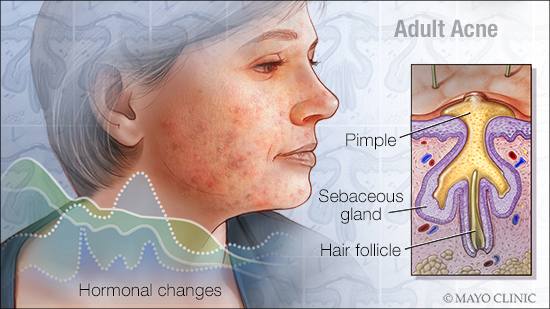-
Featured News
Mayo Clinic Q and A: Understanding adult acne
 DEAR MAYO CLINIC: I’m a 38-year-old woman who didn’t have acne as a teenager. Over the past six months, my face has started to break out for the first time. What could cause this? How can I get rid of it? Should I try the same over-the-counter products my teenage son uses for his blemishes? Or are there other remedies that work better for acne in adults?
DEAR MAYO CLINIC: I’m a 38-year-old woman who didn’t have acne as a teenager. Over the past six months, my face has started to break out for the first time. What could cause this? How can I get rid of it? Should I try the same over-the-counter products my teenage son uses for his blemishes? Or are there other remedies that work better for acne in adults?
ANSWER: Although acne is often thought of as a teen problem, it can affect people throughout their lives. The exact cause of adult acne isn’t known. In women your age, it may be connected, in part, to changes in hormones. But treatment for acne is typically the same, no matter how old you are. Start with over-the-counter therapies. If you don’t see improvement after a few months, talk with a dermatologist to find out if a prescription medication may be right for your situation.
Acne occurs when hair follicles become plugged with oil and dead skin cells. Hair follicles are connected to sebaceous glands. Those glands make an oily substance known as sebum, which normally travels up the hair shafts and out through the openings of the hair follicles onto the surface of your skin.
When your body produces too much sebum and dead skin cells, they can build up and plug the hair follicles, creating an environment where bacteria thrive. That can lead to inflammation or infection, causing pimples and other acne symptoms.
Acne often flares in teenagers because the surge of hormones during puberty stimulates the sebaceous glands, causing excess oil production. Hormone changes during midlife, particularly in women, can similarly affect the sebaceous glands, and that can lead to breakouts, too.
To get rid of adult acne, you can start with the same products you buy for your teenager. As you consider over-the-counter ointments and creams, look for those that contain benzoyl peroxide or salicylic acid. They usually are the most effective.
If, after three to four months, your acne does not improve, a dermatologist can evaluate your condition and, if appropriate, prescribe stronger medications. Prescription ointments that contain retinoic acids or tretinoin are often useful for moderate acne. Antibiotics or oral contraceptives may help in some cases, as well.
If your acne becomes severe or if other treatments do not work after several more months, your dermatologist may prescribe spironolactone (for women only). In rare cases, isotretinoin, which is a special derivative of vitamin A, may be prescribed. Isotretinoin is effective, but it can trigger significant side effects.
You may see some products marketed specifically for adult acne that claim to contain natural hormones that can “equalize” hormone imbalances and reduce breakouts. But the ingredients in these products often are derived from plants, so their chemical structure differs from hormones produced in the human body. There’s no scientific evidence that these products reduce adult acne.
Even after it’s been effectively treated, adult acne can re-emerge. So, once your acne improves, you may need to continue using acne medications to prevent new breakouts. Self-care steps also can prevent flare-ups. Wash your skin twice a day with a gentle cleanser; avoid touching or picking at acne-prone areas; and shower after exercise to get rid of oil and sweat that can trap dirt and bacteria. — Dr. Dawn Marie Davis, Dermatology, Mayo Clinic, Rochester, Minnesota







